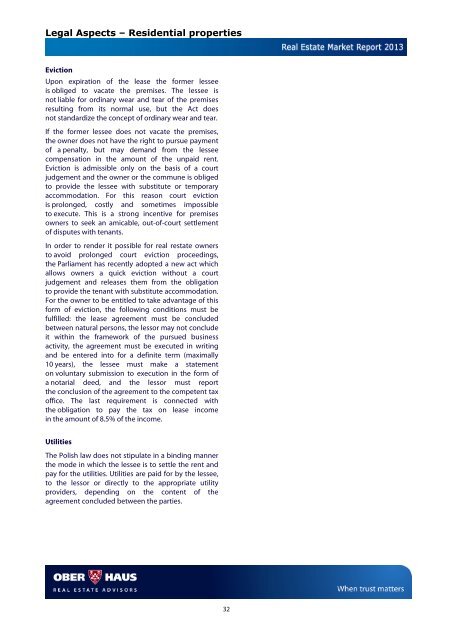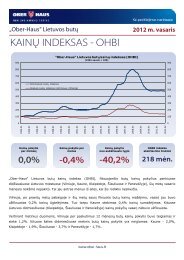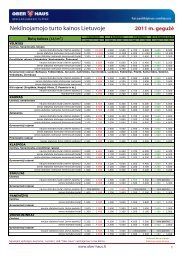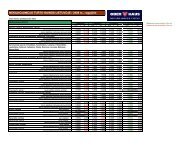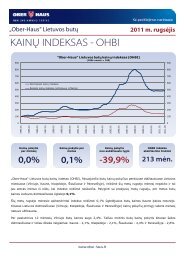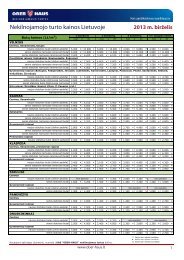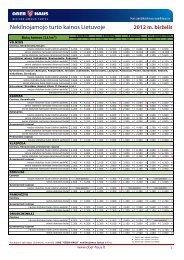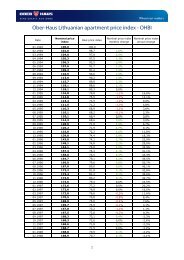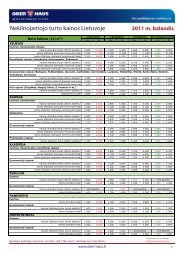Legal Aspects – Residential propertiesLease AgreementsMain IssuesGeneral terms and conditions of lease agreements areset forth in the Polish Civil Code. However, as regardsmost issues the parties may regulate their mutualrelations at their discretion. For the sake of protectionof the rights of lessees being natural persons,residential premises lease agreements are regulated inthe Code in more detail than commercial premiseslease agreements. These regulations pertain amongothers to such matters as the right of the lessee’sfamily members to live with the lessee in the leasedapartment, admissibility of rent increases, terminationof the lease agreement and eviction of a tenant. Fornatural persons being owners of apartments leasedoutside the framework of business activity, ofparticular importance are the provisions on occasionallease set forth in the Act on Protection of the Rights ofTenants, Housing Resources of Municipalities andAmendments to the Civil Code. The object of theoccasional lease agreement are premises for housingneeds. It may be concluded for a definite term of up to10 years. An occasional lease agreement must beconcluded in writing under pain of invalidity. Theowner should report to the head of the tax office thatsuch an agreement was concluded within 14 businessdays as from the commencement of the lease; a failureto fulfil this obligation entails a number ofinconveniences on the part of the owner, which arespecified in detail in the Act. Another effect of the saidreporting is that the occasional lease is governed notby the entire Act, but only its selected provisions.Regulations governing the occasional lease are aimedat protecting the owner of the apartment againstunreliable lessees, rendering it possible for him tovacate the premises quicker. This extended protectionis achieved, however, at the expense of the obligationto complete many formalities, the most important ofwhich is the obligation to report the lease agreementto the head of the tax office and the necessity toobtain from the lessee a notarial statement in whichhe subjects himself to enforcement and undertakes tovacate and surrender the premises within a time limitstipulated in the demand to vacate the premisesaddresses to the lessee by the owner.Form of the AgreementA lease agreement does not require for its validity anyspecial form, it may be concluded even orally(however, an occasional lease agreement should beconcluded in writing under pain of invalidity).Residential premises lease agreements concluded bythe former owner are binding upon the new owner,even if they are not entered in the real estate register.Term and Expiration of a Lease AgreementA premises lease agreement may be concludedfor a definite or indefinite term. A lease agreementconcluded for a definite term expires on principleonly upon the lapse of the period for which it wasconcluded or upon fulfilment of conditions stipulatedby the parties therein. Extraordinary terminationof a lease agreement is possible in the caseof a material breach of its provisions, regardlessof whether it was concluded for a definite term or not.Should the lessee use the premises after expirationof the lease agreement and should the ownerof the premises not object explicitly thereto, it isassumed that the lease agreement is prolongedbetween the parties for an indefinite term.A lease agreement concluded for an indefiniteterm may be terminated by each party thereto subjectto a three months’ termination notice. The lessormay terminate it subject to a month’s terminationnotice effective as at the end of the calendarmonth in cases expressly provided for in the Act,e.g. if the lessee damages the premises or the buildingin which the premises are situated, defaults onthe payment of the rent or other fees or sub-leasesthe premises without the lessor’s consent. If a leaseagreement is concluded for a definite term, it maybe terminated prior to the lapse of its term onlyin cases specified therein.In the case of selling the lease subject, the new ownerbecomes the part of the lease agreement by law.Additionally, termination of a lease agreementby the lessor is possible in the case of a majorrenovation of the premises or the necessityto demolish the building in which the premises aresituated. In this case the owner must providethe lessee with other premises.The lessor is entitled to demand from the lesseea security deposit in the amount not exceedingthe 12-fold of the monthly rent (in the caseof occasional lease the 6-fold of the monthly rent),but in practice the security deposit is equivalentto the amount of one or two monthly rents.If the lessor does not utilize the security deposit forthe purpose of covering his claims towards the lessee,the security deposit is charged towards the last rentinstalment or must be returned to the lessee in wholeamount within one month as from the terminationof the lease.31
Legal Aspects – Residential propertiesEvictionUpon expiration of the lease the former lesseeis obliged to vacate the premises. The lessee isnot liable for ordinary wear and tear of the premisesresulting from its normal use, but the Act doesnot standardize the concept of ordinary wear and tear.If the former lessee does not vacate the premises,the owner does not have the right to pursue paymentof a penalty, but may demand from the lesseecompensation in the amount of the unpaid rent.Eviction is admissible only on the basis of a courtjudgement and the owner or the commune is obligedto provide the lessee with substitute or temporaryaccommodation. For this reason court evictionis prolonged, costly and sometimes impossibleto execute. This is a strong incentive for premisesowners to seek an amicable, out-of-court settlementof disputes with tenants.In order to render it possible for real restate ownersto avoid prolonged court eviction proceedings,the Parliament has recently adopted a new act whichallows owners a quick eviction without a courtjudgement and releases them from the obligationto provide the tenant with substitute accommodation.For the owner to be entitled to take advantage of thisform of eviction, the following conditions must befulfilled: the lease agreement must be concludedbetween natural persons, the lessor may not concludeit within the framework of the pursued businessactivity, the agreement must be executed in writingand be entered into for a definite term (maximally10 years), the lessee must make a statementon voluntary submission to execution in the form ofa notarial deed, and the lessor must reportthe conclusion of the agreement to the competent taxoffice. The last requirement is connected withthe obligation to pay the tax on lease incomein the amount of 8.5% of the income.UtilitiesThe Polish law does not stipulate in a binding mannerthe mode in which the lessee is to settle the rent andpay for the utilities. Utilities are paid for by the lessee,to the lessor or directly to the appropriate utilityproviders, depending on the content of theagreement concluded between the parties.32


